 Petzlover
Petzlover Gordon Setter is originated from United Kingdom but West Siberian Laika is originated from Russia. Gordon Setter may grow 9 cm / 4 inches higher than West Siberian Laika. Gordon Setter may weigh 13 kg / 29 pounds more than West Siberian Laika. Both Gordon Setter and West Siberian Laika has almost same life span. Both Gordon Setter and West Siberian Laika has almost same litter size. Gordon Setter requires Moderate Maintenance. But West Siberian Laika requires Low Maintenance
Gordon Setter is originated from United Kingdom but West Siberian Laika is originated from Russia. Gordon Setter may grow 9 cm / 4 inches higher than West Siberian Laika. Gordon Setter may weigh 13 kg / 29 pounds more than West Siberian Laika. Both Gordon Setter and West Siberian Laika has almost same life span. Both Gordon Setter and West Siberian Laika has almost same litter size. Gordon Setter requires Moderate Maintenance. But West Siberian Laika requires Low Maintenance
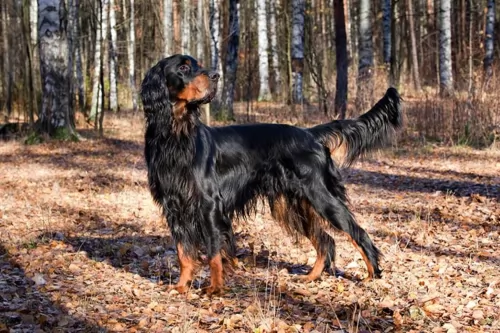 The Gordon Setter includes mixes of the English Setter and the Irish Setter. The original purpose of the breed was to hunt game birds.
The Gordon Setter includes mixes of the English Setter and the Irish Setter. The original purpose of the breed was to hunt game birds.
The dog breed hails from Scotland with a history that dates back to the 17th century. The dog was developed in Gordon Castle by the Duke of Gordon IV.
The dog became popular among hunters in the early 19th century. He is the biggest of the setter breeds. It was in 1884 that the American Kennel Club recognized the Gordon Setter.
 The West Siberian Laika come from the Khanty and Mansi tribes of West Siberia and Ural. They are a primitive breed used for hunting and come from the spitz and wolf lines. They retain many of their primitive looks and traits to this day. They were pre-historic companions to human hunters and remain so today in the northern regions of the Russia. They were never sled dogs but pure hunters throughout their journey to a domesticated breed. They hunted in the forests of the mountainous regions and were adapted to hunting in the woods. When their prey was hunted almost to extinction, the Laikas were also in danger of disappearing.
The West Siberian Laika come from the Khanty and Mansi tribes of West Siberia and Ural. They are a primitive breed used for hunting and come from the spitz and wolf lines. They retain many of their primitive looks and traits to this day. They were pre-historic companions to human hunters and remain so today in the northern regions of the Russia. They were never sled dogs but pure hunters throughout their journey to a domesticated breed. They hunted in the forests of the mountainous regions and were adapted to hunting in the woods. When their prey was hunted almost to extinction, the Laikas were also in danger of disappearing.
From the early days of the 1900’s through the first World War, there were several campaigns to save the WSL from extinction. A breed standard was developed around the 1930’s. Following the war the breeding programs became more uniformed and followed the standard that was in place. World War II disrupted it again, but once again it was resumed after the war.
The breed was once again threatened by industrialization and deforestation in the early 20th century, as they were replaced by newer, more popular breeds. There were thought to be dozens of aboriginal Laikas with various groups attached to different groups of indigenous hunters.
Following the second World War and the ever increasing detail of breed standards, the Laikas were divided into four pure bred groupings: the West Siberian Laika, the East Siberian Laika, the Russ-European Laika and the Karelo-Finnish Laika. All of these breeds are Laikas because they are bark pointing hunters.
They were imported to the U.S. in the early 1990’s by a Russian immigrant. Vladmir Beregovoy is credited with bringing the breed to the States. There are now about 300-400 West Siberian Laika’sin the U.S. They are a very emotional breed, very in touch with his human’s feelings, habits and intentions. He is a barker for sure who hates to be left alone. An intense breed with the need for companionship and a purpose. They will do anything to escape a pen if left alone for long periods of time.
The breed is protective of its people with other animals and some are wary of strangers. He needs an active family to match his active spirit. They will bark at all wild life including all the squirrels in your yard. So if don’t want a “barker”, don’t get a West Siberian Laika.
They are recognized by the United Kennel Club, the American Canine Association the Dog Registry of American and the Federation Cynologique Internationale
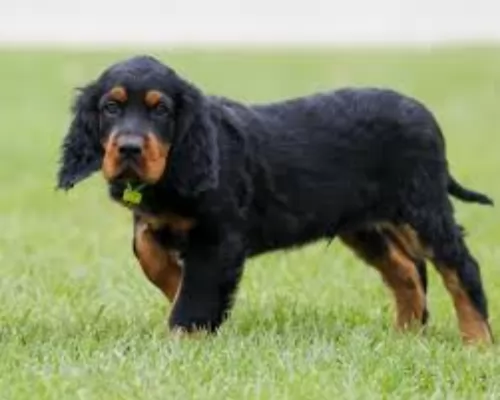 The Gordon Setter is a large dog, capable of reaching up to 69cm in height and weighing up to 36kg in weight.
The Gordon Setter is a large dog, capable of reaching up to 69cm in height and weighing up to 36kg in weight.
He belongs to the Setter family and is somewhat heavier than the other Setter breeds. Setter dogs are classified as sporting- or gun dogs. He is a beautiful dog with a pitch black coat with tan markings found around the chest, muzzle and paws as well as those two familiar tan dots above each eye.
Sometimes you can find a small amount of white on the chest. The coat is straight and silky but it can be slightly waved with feathering around the legs, chest, ears and tail. Both the tail and the ears of the dog are also long and feathery. The Gordon has an intelligent, dignified look about him.
The Gordon Setter is a confident, fearless, loyal and affectionate dog. They do well with their human families, when there are other pets in the house as well as children.
He can be a boisterous dog so training and socialization will become necessary. Your Gordon Setter is an intelligent dog and also a dog ready and willing to learn. He is calm and even-tempered but playful too.
He isn’t a dog suited to life in the city if there isn’t an adequately sized garden. He is essentially a country life dog well suited to farms or large fenced gardens.
 The WSL comes from the Spitz line and also directly descendent from the wolf. They look and act a lot like a wolf in many ways. They have retained much of their primitive traits. With a pointed, long muzzle, an almost square head, and square body, they have wolf colored coats of gray and red. They are mostly medium in size but some can be smaller or larger. Their head is shaped like a wedge, their eyes are typical almond shape and set deep in their head. They are brown or even darker. The muzzle is almost as long as the skull. Their lips are thin and black. The ears are straight up and pricked.
The WSL comes from the Spitz line and also directly descendent from the wolf. They look and act a lot like a wolf in many ways. They have retained much of their primitive traits. With a pointed, long muzzle, an almost square head, and square body, they have wolf colored coats of gray and red. They are mostly medium in size but some can be smaller or larger. Their head is shaped like a wedge, their eyes are typical almond shape and set deep in their head. They are brown or even darker. The muzzle is almost as long as the skull. Their lips are thin and black. The ears are straight up and pricked.
They have bodies longer than they are tall with a lot of musculature. They carry their tail high over their backs. With straight legs and forward feet, with gray, red and white coats, they still look like wild dogs.
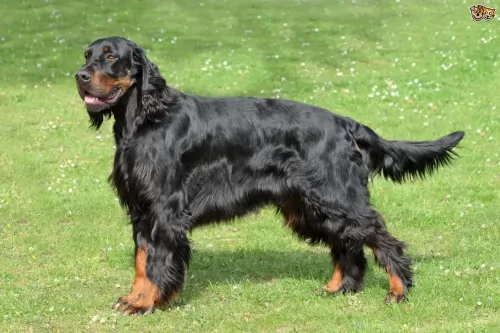 Beautiful to look at, the intelligent and even-tempered Gordon Setter has everything to be confident about. He loves the attention he gets from his human family and is always looking for a pat.
Beautiful to look at, the intelligent and even-tempered Gordon Setter has everything to be confident about. He loves the attention he gets from his human family and is always looking for a pat.
He can be stubborn and he certainly won't like the idea of being left cut off from his family for long periods of time as he is a social dog with those he knows and loves.
The Gordon Setter is energetic and playful so he will need regular exercise. When you bring a Gordon Setter into your home, you bring in a wonderfully loyal pet and companion.
 3.Adaptability This is not really an apartment dog though he can adapt. He needs outdoor space to run everyday. So if in an apartment find a dog park for everyday use.
3.Adaptability This is not really an apartment dog though he can adapt. He needs outdoor space to run everyday. So if in an apartment find a dog park for everyday use.
4.Learning ability – Highly trainable and very smart. Independent thinker though might cause some issues.
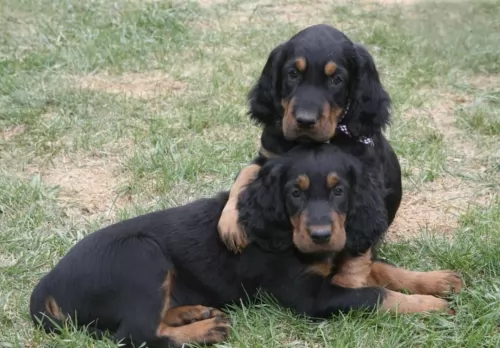 Life expectancy for the Gordon Setter is usually about 10 to 12 years and with good nutrition and care, your Gordon can easily reach 12 years of age.
Life expectancy for the Gordon Setter is usually about 10 to 12 years and with good nutrition and care, your Gordon can easily reach 12 years of age.
Every dog is prone to some common health issues and these include among others hip dysplasia, gastric torsion or bloat, retinal atrophy and ear infections.
Large dogs are more prone to hip dysplasia. The disease is a malfunction of the hip joints causing pain and loss of function in the rear legs.
This eye conditon just gets worse over time and can lead to vision loss.
An under-active thyroid causes a decrease in metabolism. Symptoms of hypothyroidism in dogs include weight gain, obesity, cold intolerance, changes in the skin and coat like hair loss and your dog is lethargic.
This can be very dangerous with your pet as the stomach is swollen and the stomach rotates and twists and can lead to death.
 Health wise there are no genetic health issues known today. Since they were so wild, primitive and isolated there was not a lot of inbreeding to any standards. There are however some interesting health facts about the WSL.
Health wise there are no genetic health issues known today. Since they were so wild, primitive and isolated there was not a lot of inbreeding to any standards. There are however some interesting health facts about the WSL.
• Females only come into estrus once a year, usually in the late winter. They are usually one to two or two and a half years old when this happens. The Russians who know them best frown on breeding them before they are at least two.
• They are subject to many of the same parasites and some diseases like any other canine. But they are not susceptable to any illness specific to their breed.
• Hunting accidents might bet he biggest health threat this breed faces at the moment.
• However with more dogs being bred for the show ring, this could all change and genetic issues could begin to pop up for them.
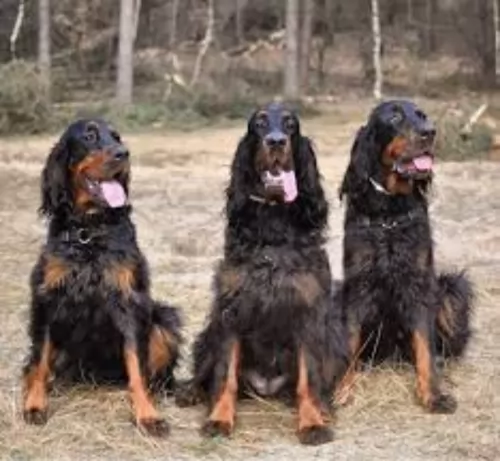 Gordon Terriers are energetic dogs so he is going to require a good deal of exercise each day. Take him with you on your walks and make sure that you give him lots of ball games and rope games.
Gordon Terriers are energetic dogs so he is going to require a good deal of exercise each day. Take him with you on your walks and make sure that you give him lots of ball games and rope games.
All Gordon Setters shed, and their coat will require a good brushing at least twice a week. Check nails, teeth and ears regularly. Brush teeth at least twice a week to prevent dental decay.
As a working dog your Gordon Setter has a special need for a high fat content diet. You can include some raw meat in his high-energy dog kibble. He can also have some cooked brown rice, chicken and vegetables added into his kibble from time to time. Make sure he has access to fresh, cool water.
 performance, working dog food. High in protein and fat is needed to maintain their lean muscle. Don’t over feed them as they will become obese and they will be unhappy if their physical activities are restricted, even if by their own weight. Be sure you break up their day’s food amount into 3-4 smaller meals.
performance, working dog food. High in protein and fat is needed to maintain their lean muscle. Don’t over feed them as they will become obese and they will be unhappy if their physical activities are restricted, even if by their own weight. Be sure you break up their day’s food amount into 3-4 smaller meals.
2.Feeding the adult – Almost everything is equally true for the adult. They need a high protein and high fat food – a high performance food. Don’t over feed and give them at least 2 meals per day.
3.Points for Good Health – as previously mentioned this is a hardy and robust breed,
4. Games and Exercises They need a lot of exercise, have a strong prey drive and are very intelligent. A dog with those traits that does not get enough exercise will drive you crazy if he is not stimulated.